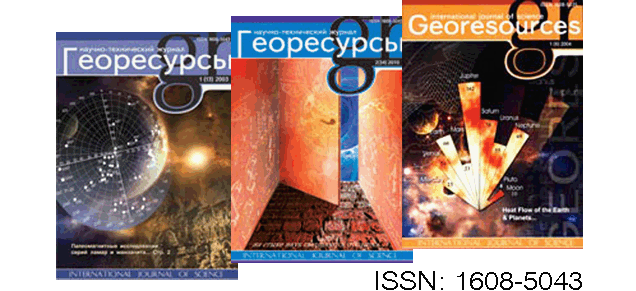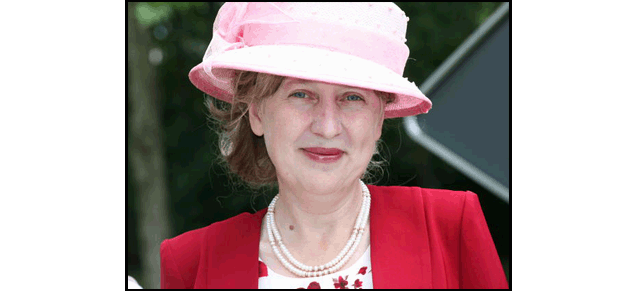Founder of the Journal 'Georesources'
Terra scientia (The land of science)
The name of the journal “Georesources” speaks for itself. Oil, gas, diamonds, water are earth’s natural resources. However…
Georesources is something immeasurable than the sum total of the individual mineral resources. Geo-resources is the diversity of the world around us, from the simplest minerals to complex biological systems. This worldview includes the mechanical process of production and consumption of a complex range of aspects of human relations with the outside world. It is actually the people themselves, who are the main resources of the planet – they are the single human civilization resource on Earth, as well as the intelligence resource. We can only regret that human potential so inefficiently been spent by the current existing governments.
And we are not far from the coming of the Earth and the planets recourses era.
The sources of creating the journal dates back to time when the honored soldier of the great patriotic war, and who later became a doctor of Technical Sciences, Professor Nikolai Neprimerov gave life to the original scientific direction of field physics or physics of the earth interior in the Kazan State University. The most modern methods of formation research, studied thousands of wells, millions of experimental points, unique instruments precision, fundamental research of movement mechanisms and transport phenomena in the porous media, new technologies for searching, exploration and development of oil and gas fields, hundreds of trained specialists etc.
The key words of the journal are traditionally connected with our scientific fields:
- Earth and planets physics
- the origin, evolution and dynamic of the earth’s layers: lithosphere, atmosphere, hydrosphere and biosphere;
-the surrounding environment and natural disasters;
- Earth resources and other bodies of the Solar system.
Tasks. The main principle of the journal is the inextricable link between science and life, the relationship of fundamental research with industrial practice.
Its main task of the journal contributors is to see the need to familiarize professionals with the latest scientific thoughts achievements. Another principle is a characteristic of the existing integrated approach in the scientific field, a comprehensive study of the natural phenomena on the micro- and macro - level. Now the once unified university subject Natural science is traditionally divided and taught as a series of separate disciplines. Earth sciences did not avoid this separation as well. We hope that our journal will contribute to the progress and integration of knowledge from different sections of Geological Sciences, it will facilitate the birth of new types of scientists whose activities are not confined to the framework "of their office."
The third vital principle of the journal is “giving preference to the facts and not the idea". The philosophical positions of the journal are facts "for" plus facts " against." In the world of science it is not the money, power of the people, and not even a passionate desire to earn recognition by colleagues that "run the show”.
In the world of science the truth "runs the show ". And as well-known it cannot be born only in glittering plastic, computerized metropolitan research institutes, but in the long "forgotten by God and man " corners of the planets too - in a wet tent, in a simple peripheral laboratory: in the depths of an old rusted well. Therefore, characterizing of the development of Earth sciences in general, we mentally give the debt back to its creators, among them are the distinguished scientists whose names are included in the golden fund of science and humble workers, from the pioneer geologist to the driller and organizer of production operations.
Addressing our journal readers, first of all we will strive to ensure that all materials are presented in a professional manner. However - "the spirit of romance and adventure", in which our traditional scientific field was developed and made a defined progress, undoubtedly touches our journal.
Once upon a time at the international symposium, a famous Russian physicist was asked a question: “To what extent do you know English?” - “I read, but I do not understand," replied the scientist. We will try not to let such a story happen to our readers of this journal.
Among the readers of the new journal, we see not only a physicist, a geologist or an oil and gas specialist, an organizer of production, or a director of a company, but also a student, a future specialist. And it is to him that we are addressing the following lines.
The human brain is designed so that it attracts more mysterious and unknown, - space, extraterrestrial civilizations, a micro world with its quaint properties. Earth as our native home, seems ordinary and simple to us. We are used to our own planet. However, on Earth just like in space, there are mysterious "black holes" - the subduction zone, where the earth’s crust disappears, there are “cosmic strings " - long, narrow strips where the pockets of natural disasters are concentrated. Specific phenomena in the asthenosphere which can be called planetary superconductivity have not been studied yet.
About the history of the discovery of deposits - is an exciting novel, full of dynamism and dramatic scenes! It’s a novel with sometimes a happy end but more often with an unfortunate end. Unconfirmed predictions, ruined ideas, a lost situation, "bumps" on the head of the organizers doing the works. Top experts of the most reputable companies did not avoid such flaws. There are always risks, risks risks...
Like geologists of oil and gas say discovering deposits - is a series of disappointments and luck. And as in any other fields, courage, experience and technological advances - are the decisive factors in exploration work. It's hard to believe, but the largest oil field in the world located in the Mideast gulf was considered unpromising for a period of more than 20 years. The first oil from the North Sea was obtained after 200 (!) boreholes became " dry." "Oil - in our heads" - this ancient adage of oil workers is fair today like never before. (A. Perrodon . History of major discoveries of oil and gas, 1985.)
Plans. The future of the journal we see a close, fruitful union between science and business. Strictly speaking, the journal - is their offspring. And we, like all parents want our child to be morally and physically health, to have good luck and creatively successful.
Our journal will publish original research papers about the most important issues of modern science in the cycle of Earth Sciences. Announcing such an extensive program of activities, we are faced with difficult challenges. Therefore, the editorial board needs the support and understanding of the readers, reviewers, and authors.
We are bound to make mistakes. We are not always able to distinguish the truth from the false. Not every one of us is given the gift to open the unknown and look "beyond the horizon". But we will make every effort to ensure that the true tradition of unselfish science, serving for the benefit of the Fatherland reigned and ruled in the pages of our journal.
Everyone who loves the earth, those who risk in our time by devoting their energy, knowledge and a piece of their soul profession, " the noblest of the noble " of science, all those whose work space is a laboratory, producing or drilling , are invited to join our journal.
Welcome!
(or uninterested trespassing is forbidden)
Natalia Nikolayevna Khristoforova (1954-2009) - Founder of the journal "Georesources"

